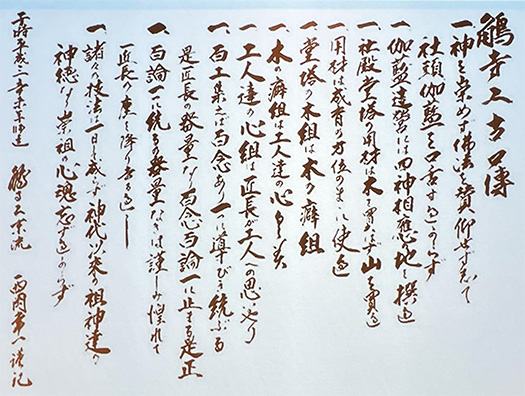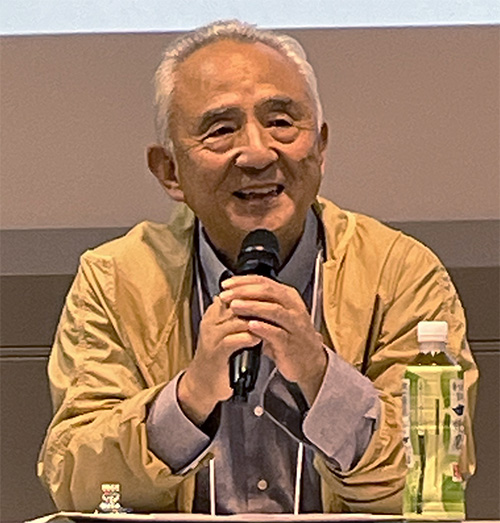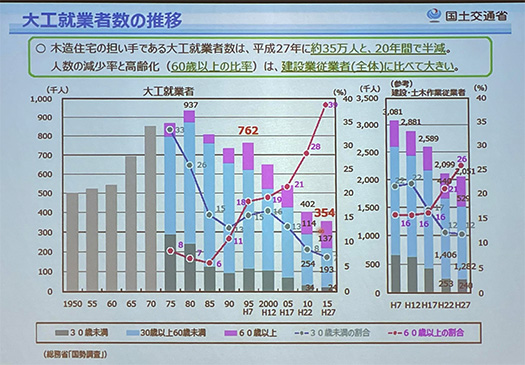


昨日今日2日間は北海道が会場になっての国の住宅月間の中央イベント開催。
その一環としての岩見沢市での大工技能関連の催事に取材参加。
さきに「削ろう会」を見学して来ましたが、こちら詳細は明日以降に。
夕方からは鵤工舎・小川三夫氏講演・対談会に参加していました。
氏は、法隆寺宮大工・西岡常一さんの弟子。
西岡氏は法隆寺の昭和の改修工事に取り組んでいたが、
工法を巡って国の諮問機関「建築工学博士」たちから構造補強のために
金物補強すべきであるという方針指示を受けた際に
「打ち首にされても、そんなことはできない」とその方針を拒否したとされる。
いわば魂の部分でのその「正嫡」と言える存在が小川氏。
お話しからはまさに西岡さんの魂魄を身を以て受け継いでいる気迫が伝わる。
「宮大工は社寺仏閣専門であり、家を建てる家大工とは流れが違う」
「しかし、手業・魂魄としては同じ」というのが氏の考え。
北海道で家大工として技術の存続継承に強い思いを持つみなさんが参集された。
木と向き合って体で関わっていく大工仕事は内語しながらの営為。
体技としての大工技能については当方には素養は無く
その精神性の部分を共有するよう内語で翻訳しながら対話していた。
自分たちのそれぞれの仕事領域で経験する内語と比較しながら、
働くということの本質について対語することになるのが自然でしょう。
体技習得とは労働基準法みたいな社会制度とはモノサシが違う。
心得という本質部分ではそうであることは伝わってくる。
そしてそれは「日本のものづくり」の本質部分の解析でもあると思われた。
いま日本の円安が進行しているけれど、ある意味では
世界の資本主義からのサインとして世界の製造業の中心に
日本が復活すべきであると後押しされているようにも思える。
事実、いろいろな企業分野で日本に製造拠点を復元させる動きがある。
半導体の製造拠点が九州に作られたり、アイリスオーヤマが中国から撤退して
日本国内で製造ラインを再構築するという発表。
自動車企業でも中国の生産ラインをまったく区分けしてその他の世界で
生産ラインを独自に生成する取り組みが活発に展開してきている。
報道される事象をはるかに超えてこうした動きは加速しているのだろう。
戦後日本の復興はものづくり製造業が世界の需要の追い風を受けたものだった。
そういう現在認識のなかで小川氏の講演・対談は視点価値があると思われた。
課題はたくさんある。
会場からの声では「ひとづくり」教育現場での現状に絶望した悲嘆的発言も。
しかし、わたし的には日本の大工体技伝統に象徴される魂魄のコアな部分が
社会全体に根付いていることを信じたいと思います。
魂魄の部分でのものづくりパワーは
日本人の意識の底流に根強くあり続けていると信じて取り組んでいくしかない。
労働基準法のような枠組みは受容した上で、魂魄は根太く継承していく。
そう考えていくことで世界の中で「ものづくり大国・日本」は生き残れる。
そんな内語・期待感を反芻しながら帰路に着いていた。
English version⬇
What is the “Inheritance of Physical Skill”? Lecture and discussion by Mitsuo Ogawa, a member of the Japanese Manufacturing Industry]
The current depreciation of the yen is a tailwind for Japan’s manufacturing industry. In fact, the manufacturing industry is making a comeback in many business fields. Let us consider the spirit of monozukuri. ……
Yesterday and today, Hokkaido was the venue for the central event of the national housing month.
As part of the event, I covered a carpentry-related event in Iwamizawa City.
I visited the “Shirouki-ro-kai” (cutting workshop) earlier, but I will give you more details tomorrow.
In the evening, I attended a lecture and discussion with Mitsuo Ogawa of Ikaruga Kosha.
Mr. Ogawa is a disciple of Tsunekazu Nishioka, the master carpenter of Horyuji Temple.
Mr. Nishioka was working on the Showa renovation of Horyuji Temple.
He was working on the renovation of Horyuji Temple in the Showa period (1926-1989), when he received a directive from the national advisory body for structural reinforcement from “doctors of architectural engineering.
When he was instructed by the government’s advisory body, “architectural engineering doctors,” to reinforce the structure with metal reinforcement, Nishioka said
He is said to have rejected this policy, saying, “Even if I am beheaded, I cannot do such a thing.
Mr. Ogawa is the “legitimate heir” of Mr. Nishioka’s soul, so to speak.
His speech conveys the spirit of Mr. Nishioka, who has inherited his spirit and soul through his own body.
He said, “Shrine carpenters specialize in shrines, temples, and Buddhist temples, which is different from the process of house carpenters who build houses.
However, the handiwork and spirit of the carpenters are the same.
The participants were all carpenters in Hokkaido who have a strong desire to continue their skills as house carpenters.
Carpentry, which involves facing the wood with one’s body, is an activity done while speaking internally.
I have no background in carpentry skills as a physical skill.
We were talking to each other, translating in our own language so that we could share the spirituality of the work.
We were comparing the internal language of our own work with the internal language we experienced in our respective fields of work.
It would be natural to have a dialogue about the nature of work.
Physical skill acquisition is not the same thing as a social system like the Labor Standards Act.
It is conveyed that it is so in the essential part of “Kokoro Gakushu”.
And it seems to be an analysis of the essence of “Japanese monozukuri.
The yen is weakening in Japan, but in a sense, it is a sign from the world capitalism that the world’s manufacturing system is not the same as Japan’s.
It is a sign from the world capitalism that Japan should revive its position at the center of the world’s manufacturing industry.
Japan should revive its position as the center of the world’s manufacturing industry.
In fact, there is a movement to restore manufacturing bases in Japan in various business fields.
There have been announcements that semiconductor manufacturing facilities will be built in Kyushu, that Iris Okayama will withdraw from China and rebuild its manufacturing lines in Japan, and so on.
Iris Okayama has announced that it will withdraw from China and rebuild its manufacturing line in Japan.
Automobile companies are also moving to create their own production lines in other parts of the world by completely separating their production lines in China from the rest of the world.
The trend is far beyond what is reported in the media.
These developments are probably accelerating far beyond what is reported in the media.
Japan’s postwar revival was a result of the manufacturing industry benefiting from a tailwind of global demand.
In this context, I thought Mr. Ogawa’s lecture and discussion were worthwhile.
There are many issues to be addressed.
Some in the audience expressed despair over the current state of “human resource development” in the field of education.
However, I would like to believe that the core of the spirit symbolized by the Japanese carpentry tradition has taken root in the society as a whole.
I would like to believe that the core of the spirit and soul symbolized by the Japanese carpentry tradition has taken root in the society as a whole.
The power of monozukuri in the spirit of the soul is
We have no choice but to work on it, believing that it continues to be deeply rooted in the undercurrent of the Japanese people’s consciousness.
While accepting a framework such as the Labor Standards Law, the spirit of monozukuri must be passed on from generation to generation.
By thinking in this way, “Japan, a manufacturing powerhouse,” can survive in the world.
I was on my way back home, ruminating on such internal words and expectations.
Posted on 10月 16th, 2022 by 三木 奎吾
Filed under: こちら発行人です, 日本社会・文化研究







コメントを投稿
「※誹謗中傷や、悪意のある書き込み、営利目的などのコメントを防ぐために、投稿された全てのコメントは一時的に保留されますのでご了承ください。」
You must be logged in to post a comment.